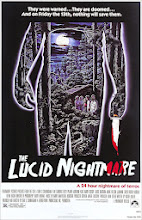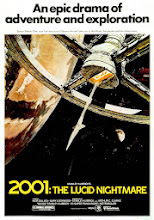Agora
Director: Alejandro Amenabar
Year 2009
Agora is a poignant and stirring opus, displaying the harsh consequences when the clashing of faiths drive mankind to madness and turmoil against one another. This masterfully executed film hits the senses like a freight truck as it tackles some pretty weighty subjects and religious beliefs, all the while maintaining a cohesive and contemplative story that never fails to peak the viewer's interest.
The director of this film, Alejandro Amenabar, has crafted something very special between these beautiful set pieces and authentically reconstructed Egyptian landscapes. This is a far fetch from his previous films where he dabbled in science fiction with Abre los ojos, then with the haunting ghost tale The Others, and with his emotionally driven drama The Sea Inside. With Agora, he tackles a film that's steep in historical imagery and abundantly epic in scale with its purely engaging narrative elements.
Got it made, got it made, got it made! I'm hot for the atheist teacher!
The film takes place in 4th century Egypt in the city of Alexandria, now under the control of the waning Roman Empire. Cultural unrest has ignited among the people, inciting Atheists, Jews, Pagans, and Christians to clash over the right to claim religious supremacy. The atmosphere of this tempered and volatile time is captured superbly by Alejandro and company. The tension lies thick in the air as open disputes boil over to full out war between the various factions. Never has these ancient civilizations felt so real and brimming with life. I must say that the filmmakers have done a tremendous job in bringing this all into the realm of believability, with great use of lavish sets and subtle CGI work for the expansive vistas. This is one beautiful movie, that aches for someone to view it in all its eye catching splendor.
Hypatia and her father stroll past their favorite giant sculpture.
A statue of a man on the crapper.
The centerpiece of this story and the main balance point that keeps all of these chaotic proceedings chained to a streamlined narrative, is the character of Hypatia, played by the always beautiful and enchanting Rachel Weisz. Hypatia is a teacher, philosopher, and atheist, in a time where to not have a god is equal to death. Her beliefs and stubborn pursuit of scientific facts and truth, lay a conflicting path across the over encumbering beliefs of a rising force in the world, Christianity. These world changing events that are taking place at this time are shadowed by the intimate encounters between Hypatia and her students.
The most important of these interactions are between her slave Davus, played by the passive yet intense Max Minghella, and one of her top students, the ambitiously driven Orestes, played by a conflicted yet cocky Oscar Isaac. Both men give a great deal of range throughout the film and provide the depth that is needed to bridge the span of this lengthy film that stretches over several years of the Christians rise and inherent takeover. Without a doubt, the acting in this film is above and beyond anything that has come out in recent years.
Old man Peabody used to own all this land.
He had a strange obsession about breeding pine trees.
The tension that the filmmakers have been able to capture for this film is insanely palpable, throwing us right in the thick of this tremendously bloody and frighteningly savage battle between two opposing religious beliefs. The raw nature of these events are splashed up onto the screen for all to see, never holding back and never shying away from the horrible realities of what occurred during these turbulent times.
To believe that mankind could be so cruel to each other over something as silly as a personal belief in something, is quite disturbing and insanely warped, yet in all the years since, we still haven't learned a damn thing. It's easy to get worked up over this narrative and find a sympathetic thread to relate to from our own society, where bigotry, prejudice, and racism, still thrive. The filmmakers wisely bring this concept to our attention and hopefully in their bold presentation of this hot fire topic, shed some much needed light on this cyclical problem that keeps rearing its ugly head within the human race. In Alejandro Amenabar's epic masterpiece, Agora, he makes a bold statement to all of mankind, wake up.
Wave your hands in the air, and wave them like you just don't care!
There are some enchanting and haunting moments in Agora. Moments that make you step back from the film and all that is going on with it, and really reflect on the ethereal moment being displayed on the screen. The perfect example of these contemplative occasions, is when we are treated to some birds eye view shots from high above the city, looking down towards the throngs of people as they fight amongst themselves far below.
Whether you're religious or not, you get a great sense from these striking shots, that there is a greater being out there, watching over all that is playing out over his or her name. You almost get a sense that you are a god yourself, spectating over your creation as it slowly destroys itself. It's a high handed, yet a truly intimate moment that really propels this film into a whole other echelon of filmmaking.
Wow! I can see my house being ransacked from here!
Another moment of greatness comes when the Roman Empire has decreed that the Christians get full control of the Library of Alexandria, forcing out the Pagans and leading to the destruction of thousands of priceless writings and ideas collected over centuries of study. Alejandro depicts this catastrophic event with a bit of flavor and stylistic flare, by slowly flipping the frame of the shot so that it finally rests upside down, mimicking the way that the world has now been flipped on its head and all the teachings have been thrown out the window in pursuit of an at the time narrow and singularly driven belief in Christianity. I love this scene and commend Alejandro for making such a strikingly visual exclamation on such a pivotal event that greatly changed the evolution and mental development of all of mankind.
You spin me right round baby right round,
like a Roman baby right round, round, round.
All of these events swarm around the main characters of this film as they interact with each other and weave a more intricately and intimate story of their own that reflects the bigger picture of religious upheaval and unrest. Rachel Weisz and Oscar Isaac's portrayal of Hypatia and Orestes and their complicated love is rather intriguing and we're never given the typical hollywood romance that many historical epics fall into and in the end mistakenly focus on. Instead we are given a very humanized and real depiction of two people who rely on each other's wisdom and friendship to help guide each other through very trying times. We are never really given the distinct realization that they are an official couple or married or anything like that. It's compelling in its simplistic presentation and one that seems rather unique. The ambiguity of their relationship is quite refreshing and for me it felt that much more real.
Memories, of the way we were.
On the flip side of this happy couple, we have the slave Davus, who once rejected by Hypatia in a heated moment of confusion, grief, and anger, rejects his shackles of slavery and embraces the appealing teachings of the Christians. He sets out on an entirely different life that casts both Hypatia and himself hurtling into totally different worlds in both religious beliefs and moral encounters. Max Minghella plays Davus with such a diverse range, from his humble and passive life as a slave to his matured and contemplative inner struggle as a Christian that doubts his own religion. There's so many layers to his character and there's such a depth to the religious seesaw that his character goes through, that it really makes for compelling viewing.
Damn it feels good to be a gangsta.
Even without the semi-love triangle story, Hypatia's character is both intriguing and inspirational as she tries desperately to uncover the mysteries of the universe. She is determined to explain the rotation of the earth around the sun and to uncover the universal function of ellipses to a world that believes any talk of such things to be heresy and witchcraft. Hypatia is a brilliant and inquisitive mind in a world where questions are answered by faith and nothing more. The explanation of solving the cosmos pales in comparison to the impending events unraveling between the strong beliefs over religion. Weisz is absolutely spellbinding in her performance of a woman who was far ahead of her time.
This comes to no surprise because she has never faltered for a moment in the various roles that she has undertaken. Her portrayal of the terminally ill Izzi Creo in Darren Aronofsky's The Fountain, is one of the most outstanding performances that I've seen in recent years and it's one that shows just how capable of an actress she is. In Agora, she stays true to her tremendous reputation in delivery momentous performances that really tug at your soul and leave you wanting more.
I brought you all here to ask if I look fat in this robe. Well?
The brutality of this film is quite blunt and viscously portrayed, giving us a great sense of how it might have been during this dangerous time of change. We are shown decapitations, bloody stonings, and massive mobs of blood thirsty zealots as they slaughter anyone in their path that is not of their religion. It's a savage film to say the least, and presenting it in this manner greatly helps us believe that what we are seeing is as close to reality as we can get, unless we had a time machine.
The violence that we see in Agora is in your face, but it's not for show or shock value. The natural escalation of violence that inhibits the screen is always shown to help move the plot along and progress the ever expanding control that the Christian movement had over Alexandria in this moment in time. It's a very telling story of how so much blood was spilled in order for a single religious faction to exist, one that was supposedly formed to promote peace and love under one god. It's a mad, mad world.
It's rush hour in the city of Alexandria.
Agora is a film that has so many things to say yet brilliantly it lets us come up with much of the inner dialogue. It allows us to look inside ourselves and question what we are seeing on the screen. Whether we're Christian, Jewish, or whatever religion you practice, it's safe to say that we all have our own way of looking at the world and our own personal way of believing in something other then ourselves. This film revels in that unique and diverse notion that lies in all of us and presents us with a grand plot that touches on so many sensitive subjects, yet lets us decide on what is right and wrong.
From the cast, the sets, the direction, and the stupendous acting, the world of 4th century Alexandria has sprung to life giving us a story that is so compelling and filled with such drama, that it holds itself high among the filmmaking elite. Never has a film been so poignant in both its inner message and exterior presentation. I strongly recommend this film to anyone that loves period dramas on an epic scale and films that have a message that everyone must witness.
4 out of 5 stars An Epic Film Showing the Clashing of Religions































































































































